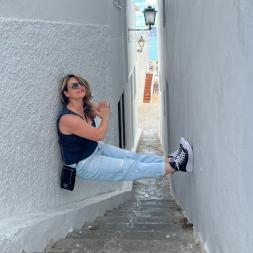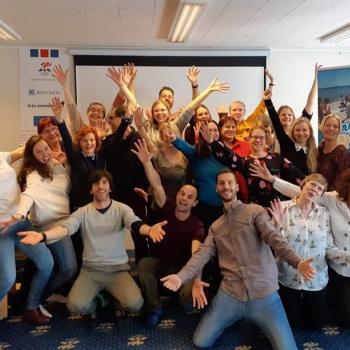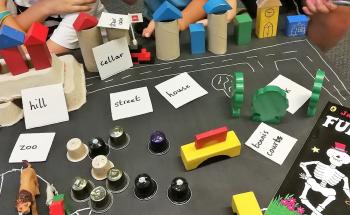
THE POSITIVE TEACHER, SPAIN. Discover the power of positive psychology in your classroom
Build a student and teacher mindset which increases happiness, well-being and self-esteem, and nurtures success for both you and your students.
• Designed by teachers for teachers.
• Activities tried, tested and approved by teachers and students.
• Methodology renowned internationally.
• Innovative, effective and motivating!
• Fun regional activities with local course providers.
Description
This course will give you the tools to create a classroom setting where everyone can optimise their values and strengths by using the methods of positive psychology.
- Positive education is an approach to schooling which uses positive psychology to enhance learning by putting the emphasis on students’ individual strengths and what particularly motivates them. In this course, we will look at how focusing on our values and personal strengths helps individuals increase their self-esteem and flourish.
- The idea of actively focusing on “the good” is at the heart of positive education. In order to achieve this, we must train our attention to notice even the smallest of successes in ourselves and our students. As we say at Smart Teachers Play More, “A little is a lot!”. Small victories are worth celebrating!
- The more challenges or obstacles our students face, the greater their need for positive feedback. We will give you tools to help your students recognise their skills and achievements and set goals suitable and motivating for them.
- Education systems in general tend to judge or grade students on what is lacking in their academic progress instead of looking at the whole student. Students are compared with curriculum expectations and each other instead of reviewing individual progress and skills.
- In this course, we will also show you how the Icelandic school system, in both primary and secondary, centres on individual goals within the national curriculum. Students work and are evaluated at their own level and are not restricted to year group goals. There is also a strong focus on personal, social and practical subjects as well as academic ones.
- Activities can be used with students aged 8 upwards.
Learning objectives
- To create a fun learning environment where teachers can share experiences and learn from like-minded professionals.
- To introduce the ideology behind positive education.
- To give teachers first-hand experience and tools to promote positive psychology and well-being practices inside and outside the classroom.
- To increase awareness of student and teacher mindsets which increase happiness, well-being and self-esteem.
- To introduce activities which encourage everyone to discover and focus on their values.
- To introduce activities which encourage everyone to discover and focus on their strengths.
- To try out tools to help your students build their own skill bank and set motivating goals for themselves.
- To be aware of where we focus our attention as a positive teacher.
- To encourage physical activity whilst learning.
- To give teachers the opportunity to share successful activities they use in their own school/country so we can learn from each other.
- To help teachers plan the vision for their positive classroom culture with time to reflect on their individual schools and plan realistic steps for implementation and success.
- To have fun, share experiences and learn from like-minded teachers from different countries.
- To connect teachers for future international collaborations and projects.
Methodology & assessment
• Presentation of the latest theory behind the benefits of Positive Psychology in learning with practical examples.
• First-hand experience and practice of key activities and tools used to implement well-being practices including mindfulness and meditation as a part of the daily school routine.
• Take part in value-check in activities and explore the difference between values and goals.
• Discover your own character strength/s through an online test.
• Explore how character strengths can be used to increase happiness and motivation.
• Try out tools to help your students build their own strength and skills knowledge bank and set motivating goals for themselves.
• Regular short brain-breaks when necessary to demonstrate energising, calming and brain-gym activities.
• Reflection and discussion opportunities focused on how to adapt and design activities for our own classroom settings.
• Sharing good practice session encouraging participants to share successful activities from their own practice.
• Structured networking opportunities so teachers can find suitable partners to continue their Erasmus learning journey.
• Vision planning session at the end of the course to plan short, medium and long term action based on learning during the mobility.
• Presentations of vision plans.
• Active listening session to reflect on course experience.
• Cultural activities including learning activities on the beach, the “Spanish Corner” presentation and cultural evening with Spanish cuisine.
All slides and materials are given to the participants during the course.
Certification details
- Letter of Intent/Invitation.
- Certificate of Attendance.
- Europass Mobility Document.
- Learning Agreement.
- Evaluation form.
Pricing, packages and other information
-
Price:595Euro
Additional information
-
Language:English
-
Target audience ISCED:Primary education (ISCED 1)Lower secondary education (ISCED 2)Upper secondary education (ISCED 3)
-
Target audience type:TeacherSchool PsychologistTeacher Educator
-
Learning time:25 hours or more
Upcoming sessions
Past sessions
More courses by this organiser

SMART TEACHERS PLAY MORE, ICELAND. Combine academic subjects and language learning with play and movement games to optimise learning!

INSPIRING YOUNG LANGUAGE LEARNERS with CLIL methodology, SPAIN. Enhance student motivation using fun projects and multi-modal techniques

